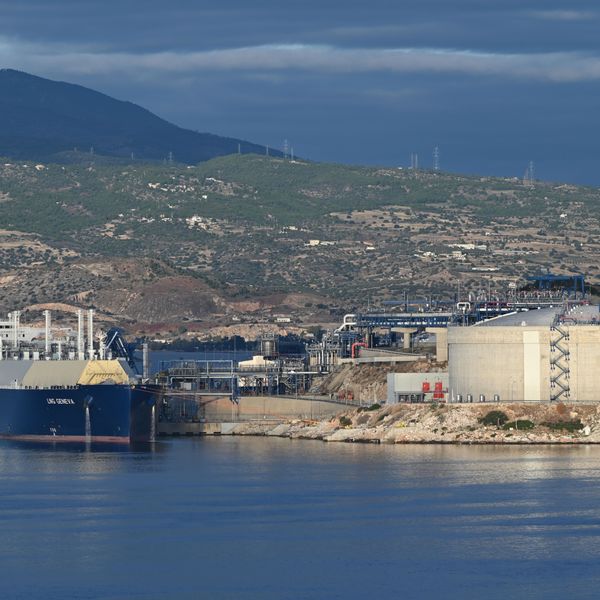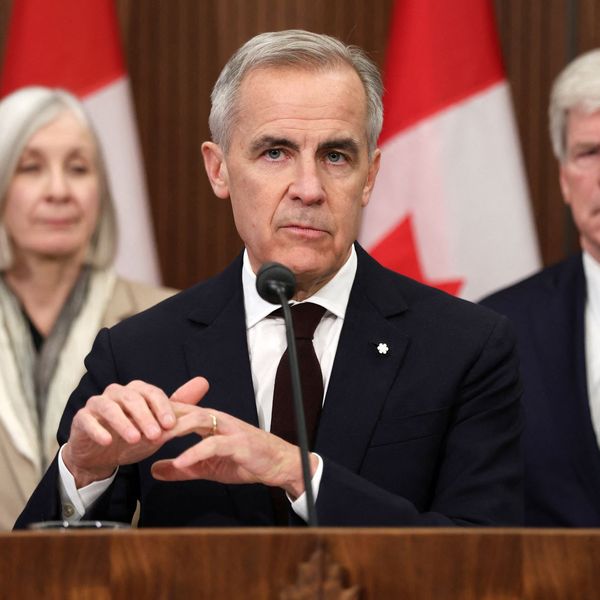Climate Commitments Be Damned, Trudeau OKs 'Carbon Bomb' LNG Project
"It's not possible to be a climate leader and build new fossil fuel infrastructure like the Petronas fracked gas plant."
Derrick O'Keefe points out at Ricochet that "In a submission to the project's environmental assessment, Marc Lee of the Canadian Centre for Policy Alternatives described Pacific NorthWest LNG as a 'carbon bomb.'"
The multiple conditions the federal government attached to the project did little to quell climate concerns from environmental groups.
Matt Horne, associate B.C. director at the Pembina Institute, said, "Even with the conditions included in the approval, the project would still be significantly higher polluting than other LNG proposals in the province (31% higher than LNG Canada, and 75% higher than Woodfibre LNG)."
On top of that, Horne said, "B.C. is already projected to miss its climate targets by a wide margin and the province's new climate plan did little to solve the problem."
Added Caitlyn Vernon, campaigns director at Sierra Club B.C., "190 conditions don't change the math: it's not possible to be a climate leader and build new fossil fuel infrastructure like the Petronas fracked gas plant."
"Not only will this project push our Paris climate commitments further out of reach, it also goes against the expressed wishes of several First Nations along the route," stated Mike Hudema, climate and energy campaigner at Greenpeace Canada.
And "Beyond the project being one of the largest greenhouse gas emitters in Canada," writes Council of Canadians political director Brent Patterson:, "the LNG terminal and its associated upstream operations would also consume 5.1 million cubic meters of fresh water per year, the equivalent of the annual fresh water use of 56,000 people."
And then there's the issue of the project's impacts on salmon.
The Wilderness Committee explains that the terminal "is slated to be built on top of an eelgrass bed that supports 88 per cent of the salmon in the Skeena River and all those who rely on them." Vernon says the approval means "Canada's second largest salmon run, on the Skeena River, may have had its death warrant signed."
Also warning of its impacts on the salmon population, Grand Chief Stewart Phillip of the Union of British Columbia Indian Chiefs said, "This is another example of betrayal of the rights and interests of First Nations people."
Ninety scientists and climate experts from Canada, the U.S., and Australia in May wrote to Prime Minister Justin Trudeau, urging him to reject the project, stating, "Honoring the commitment Canada made in Paris to limit global warming well below 2.0 degrees above pre-industrial levels will require a massive effort to reduce emissions. We must begin by rejecting plans that would increase GHG emissions and lock us in fossil fuel extraction for decades to come."
"If you are in a hole, you shouldn't dig deeper. What you should really do is start to get out of that hole," signatory Kirsten Zickheld, a professor at Simon Fraser University, said to the Vancouver Sun. "In this case, what it really means is leaving fossil fuels behind and embarking on a renewable energy trajectory."
Otherwise, said Vernon, we can't "expect to pass on a livable world to our children and generations yet unborn."
An Urgent Message From Our Co-Founder
Dear Common Dreams reader, The U.S. is on a fast track to authoritarianism like nothing I've ever seen. Meanwhile, corporate news outlets are utterly capitulating to Trump, twisting their coverage to avoid drawing his ire while lining up to stuff cash in his pockets. That's why I believe that Common Dreams is doing the best and most consequential reporting that we've ever done. Our small but mighty team is a progressive reporting powerhouse, covering the news every day that the corporate media never will. Our mission has always been simple: To inform. To inspire. And to ignite change for the common good. Now here's the key piece that I want all our readers to understand: None of this would be possible without your financial support. That's not just some fundraising cliche. It's the absolute and literal truth. We don't accept corporate advertising and never will. We don't have a paywall because we don't think people should be blocked from critical news based on their ability to pay. Everything we do is funded by the donations of readers like you. Will you donate now to help power the nonprofit, independent reporting of Common Dreams? Thank you for being a vital member of our community. Together, we can keep independent journalism alive when it’s needed most. - Craig Brown, Co-founder |
Derrick O'Keefe points out at Ricochet that "In a submission to the project's environmental assessment, Marc Lee of the Canadian Centre for Policy Alternatives described Pacific NorthWest LNG as a 'carbon bomb.'"
The multiple conditions the federal government attached to the project did little to quell climate concerns from environmental groups.
Matt Horne, associate B.C. director at the Pembina Institute, said, "Even with the conditions included in the approval, the project would still be significantly higher polluting than other LNG proposals in the province (31% higher than LNG Canada, and 75% higher than Woodfibre LNG)."
On top of that, Horne said, "B.C. is already projected to miss its climate targets by a wide margin and the province's new climate plan did little to solve the problem."
Added Caitlyn Vernon, campaigns director at Sierra Club B.C., "190 conditions don't change the math: it's not possible to be a climate leader and build new fossil fuel infrastructure like the Petronas fracked gas plant."
"Not only will this project push our Paris climate commitments further out of reach, it also goes against the expressed wishes of several First Nations along the route," stated Mike Hudema, climate and energy campaigner at Greenpeace Canada.
And "Beyond the project being one of the largest greenhouse gas emitters in Canada," writes Council of Canadians political director Brent Patterson:, "the LNG terminal and its associated upstream operations would also consume 5.1 million cubic meters of fresh water per year, the equivalent of the annual fresh water use of 56,000 people."
And then there's the issue of the project's impacts on salmon.
The Wilderness Committee explains that the terminal "is slated to be built on top of an eelgrass bed that supports 88 per cent of the salmon in the Skeena River and all those who rely on them." Vernon says the approval means "Canada's second largest salmon run, on the Skeena River, may have had its death warrant signed."
Also warning of its impacts on the salmon population, Grand Chief Stewart Phillip of the Union of British Columbia Indian Chiefs said, "This is another example of betrayal of the rights and interests of First Nations people."
Ninety scientists and climate experts from Canada, the U.S., and Australia in May wrote to Prime Minister Justin Trudeau, urging him to reject the project, stating, "Honoring the commitment Canada made in Paris to limit global warming well below 2.0 degrees above pre-industrial levels will require a massive effort to reduce emissions. We must begin by rejecting plans that would increase GHG emissions and lock us in fossil fuel extraction for decades to come."
"If you are in a hole, you shouldn't dig deeper. What you should really do is start to get out of that hole," signatory Kirsten Zickheld, a professor at Simon Fraser University, said to the Vancouver Sun. "In this case, what it really means is leaving fossil fuels behind and embarking on a renewable energy trajectory."
Otherwise, said Vernon, we can't "expect to pass on a livable world to our children and generations yet unborn."
Derrick O'Keefe points out at Ricochet that "In a submission to the project's environmental assessment, Marc Lee of the Canadian Centre for Policy Alternatives described Pacific NorthWest LNG as a 'carbon bomb.'"
The multiple conditions the federal government attached to the project did little to quell climate concerns from environmental groups.
Matt Horne, associate B.C. director at the Pembina Institute, said, "Even with the conditions included in the approval, the project would still be significantly higher polluting than other LNG proposals in the province (31% higher than LNG Canada, and 75% higher than Woodfibre LNG)."
On top of that, Horne said, "B.C. is already projected to miss its climate targets by a wide margin and the province's new climate plan did little to solve the problem."
Added Caitlyn Vernon, campaigns director at Sierra Club B.C., "190 conditions don't change the math: it's not possible to be a climate leader and build new fossil fuel infrastructure like the Petronas fracked gas plant."
"Not only will this project push our Paris climate commitments further out of reach, it also goes against the expressed wishes of several First Nations along the route," stated Mike Hudema, climate and energy campaigner at Greenpeace Canada.
And "Beyond the project being one of the largest greenhouse gas emitters in Canada," writes Council of Canadians political director Brent Patterson:, "the LNG terminal and its associated upstream operations would also consume 5.1 million cubic meters of fresh water per year, the equivalent of the annual fresh water use of 56,000 people."
And then there's the issue of the project's impacts on salmon.
The Wilderness Committee explains that the terminal "is slated to be built on top of an eelgrass bed that supports 88 per cent of the salmon in the Skeena River and all those who rely on them." Vernon says the approval means "Canada's second largest salmon run, on the Skeena River, may have had its death warrant signed."
Also warning of its impacts on the salmon population, Grand Chief Stewart Phillip of the Union of British Columbia Indian Chiefs said, "This is another example of betrayal of the rights and interests of First Nations people."
Ninety scientists and climate experts from Canada, the U.S., and Australia in May wrote to Prime Minister Justin Trudeau, urging him to reject the project, stating, "Honoring the commitment Canada made in Paris to limit global warming well below 2.0 degrees above pre-industrial levels will require a massive effort to reduce emissions. We must begin by rejecting plans that would increase GHG emissions and lock us in fossil fuel extraction for decades to come."
"If you are in a hole, you shouldn't dig deeper. What you should really do is start to get out of that hole," signatory Kirsten Zickheld, a professor at Simon Fraser University, said to the Vancouver Sun. "In this case, what it really means is leaving fossil fuels behind and embarking on a renewable energy trajectory."
Otherwise, said Vernon, we can't "expect to pass on a livable world to our children and generations yet unborn."

